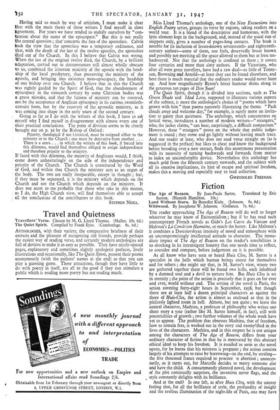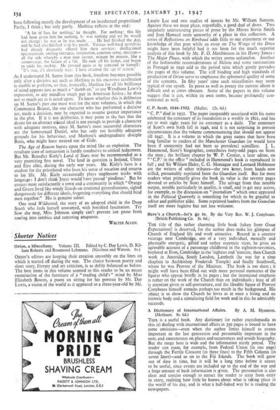Fiction
The Age of Reason. By Jean-Paule Sartre. Translated by Eric Sutton. (Hamish Hamilton. 10s.)
THE reader approaching The Age of Reason will do well to forget whatever he may know of Existentialism ; but if he has read such contemporary French novels as Gide's Les Cams du Vatican and Malraux's La Condition Humaine, so much the better. Like Malraux's it combines a Dostoievskyan intensity of mood and atmosphere with an uncompromisingly intellectual attitude to character. The imme- diate impact of The Age of Reason on the reader's sensibilities is so shocking in its intransigent honesty that one needs time to reflect, to consider and compare, before judgement on it is possible.
As all know who have seen or heard Huis Clos, M. Sartre is a specialist in the hells which human beings create for themselves and for others ; dile might say that, in M. Sartre's view, where two are gathered together there will be found two hells, each inhabited by a damned soul and a devil to torture him. But Huis Clos is set in eternity ; the point of the action is precisely that it goes on for ever and ever, world without end. The setting of the novel is Paris, the action covering forty-eight hours in September, 1938, but though there are at least half a dozen principal characters as against the three of Huis-Clos, the action is almost as enclosed as that in the pitilessly lighted room in hell. Almost, but not quite ; we leave the central character, Mathieu, a professor of philosophy who writes one short story a year (rather like M. Sartre himself, in fact), still with potentialities of growth • two further volumes of the whole work have yet to appear. The problem that obsesses Mathieu, that of freedom, how to remain free, is worked out in the story and exemplified in the lives of the characters. Mathieu, and in this respect he is not unique among the characters of The Age of Reason, differs from your ordinary character of fiction in that he is motivated by this abstract ethical ideal to keep his freedom. It is assailed as soon as the novel opens, for he learns that his mistress is pregnant ; the action consists largely of his attempts to raise by borrowing—in the end, by stealing— the five thousand francs required to procure in abortion ; unneces- sarily, as it turns out, for Marcelle decides to marry someone else and have the child. A consummately planned novel, the development of the plot continually surprises, the invention never flags, and the style constantly delights with its brilliance.
And at the end? Is one left, as after Huis Clot, with the uneasy feeling that, for all the brilliance of style, the profundity of insight and the restless illumination of the night-life of Paris, one may have
been following merely the development of an intellectual proposition? Partly, I think ; but only partly. Mathieu reflects at the end :
' A lot Of fuss for nothing,' he thought. For nothing: this life had been given him for nothing, h: was nothing and yet he would not change: he was as he was made. . . . He had finished the day, and he had also finished with his youth. Various well-bred moralities had already discreetly offered him their services: disilluzioned epicureanism, smiling tolerance, resignation, common sense, stoicism— all the aids whereby a man may savour, minute by minute, like a connoisseur, the failure of a life. He took off his jacket, and began to undo his necktie. He yawned again as he repeated to himself: ' It's true, it's absolutely true: I have attained the age of reason.'
As I understand M. Sartre from this book, freedom becomes possible only after a decisive act such as Mathieu in his excessive cerebration is unable to perform, so that, ironically, Mathieu for all his brilliance of mind appears just as much a " dumb ox," to use Wyndham Lewis's expression, as any mindless tough guy in American fiction ; he does not so much act as is acted upon. To know whether this is deliberate on M Sartre's part one must wait for the next volumes, in which the Communist Brunet, the one character who has performed a decisive act, made a decision, may be expected to assume greater importance in the plot. If it is not deliberate, it may point to the fact that the desire for an abstract ethical ideal is not enough to provide a character with adequate motives, since M. Sartre's most successful characters are the homosexual Daniel, who has only too horribly adequate grounds for his behaviour, and Mathieu's undergraduate disciple Boris, who might have strayed out of Gide.
The Age of Reason bursts upon the mind like an explosion. The resultant state of concussion is hardly conducive to critical judgement. But Mr. Benedict Kiely's Land of Stars may be recommended as a very promising first novel. The land in question is Ireland, Ulster and Eire alike, during the early war years. Mr. Kiely's hero is a student for the priesthood who loses his sense of vocation and returns to lay_ life. Mr. Kiely occasionally plays unpleasant tricks with language : I don't think Joyce would have passed piodious.' But he creates most satisfactorily a town and a community in which " Orange and Green lived like windy lizards on irrational generalisations, sighed dangerously for different ideals, forgetting everything that should bind men together." His is genuine talent.
One read Wildwood, the story of an adopted child in the Deep South who feels herself unwanted, with horrified fascination. Try bow., she may, Miss Johnson simply can't prevent her prose from soaring into iambics and cantering anapaests. -
WALTER ALLEN.



































 Previous page
Previous page